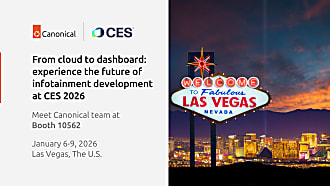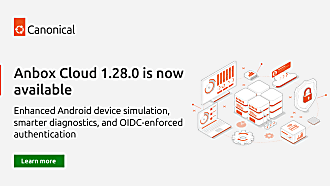Bertrand Boisseau
on 9 September 2024
Canonical’s Anbox Cloud brings new development and testing features to improve in-vehicle infotainment
Support for AAOS (Android™ Automotive OS) enables improved testing and seamless scalability to make Android Automotive development easier.
London, 9 September 2024.
We are thrilled to announce that Anbox Cloud, Canonical’s solution to stream apps from the cloud, is now available for AAOS – Android Automotive Operating System.
AAOS (Android Automotive OS) is a specially designed automotive infotainment version of Android addressing the increasing challenges and importance of an in-car infotainment OS. With vehicles becoming more connected, the demand for a flexible OS to manage in-car entertainment and functionalities continues to grow. AAOS, tailored for automotive use, offers a full-feature OS supporting various apps, features, and services while maintaining a familiar Android UI and UX. This enables OEMs and developers to provide innovative and user-friendly in-car experiences.
AAOS integrates seamlessly with a variety of hardware configurations, allowing for extensive customization and optimization. Its fairly open nature helps developers create new applications and features that enhance the driving experience. With the rapid adoption of AAOS by major car manufacturers and its growing ecosystem of compatible apps and services, it has become a popular choice in the infotainment market.
Unfortunately, the path to developing robust infotainment systems is tricky, as it includes logistical obstacles. Traditionally, tablets or hardware benches are shipped to developers, leading to delays and complexities such as hardware availability, logistics, and system configuration that needs to be aligned across distributed teams. Hardware dependencies often cause issues, leading to delays in testing until the hardware becomes available. What’s more, there are usually many hardware variants which can differ from a developer’s testing bench, complicating the setup of a representative test environment, requiring expert resources and time. There is a clear need for a cloud-native approach that provides consistent environments, simplifies rapid scalability and onboarding.
At Canonical, we care deeply about the developer experience and to improve this, we wanted to enable better testing for infotainment development. Our latest Anbox release is compatible with AAOS, enhancing infotainment development for automotive Android apps and images, offering the necessary tools for creating the next generation of automotive applications and operating systems. Let’s take a look at these new features and how they will improve and speed up your development, testing, and deployment processes.
Key automotive Anbox features
Running reference AAOS images
Anbox Cloud allows developers to easily deploy and run reference Android Open Source Project (AOSP) images. We’ve added support for AAOS images, which is absolutely essential for validating applications and ensuring they can run correctly. By providing a consistent and stable baseline, developers can implement and test their Android applications in an environment that can closely resemble their target hardware and use cases. This capability speeds up the development process and ensures higher quality and reliability in the final product.
Moreover, running reference AAOS images enables teams to identify potential issues early in the development cycle. By catching bugs and inconsistencies in a controlled environment, developers can address them before they are deployed on target hardware. This proactive approach saves your team time and resources through quick iteration and testing.
OEM or Tier 1 specific Android images
Because we know that OEMs and Tier 1s often do not use “off-the-shelf” unmodified AAOS images, but rather customize them to fit their specific needs, we wanted to offer support for tailor-made AAOS-based images. This feature allows OEMs and suppliers to test and configure their unique images, therefore ensuring seamless integration and optimal performance in their specific target vehicle configurations. This allows for a precise development approach, so that teams can address the distinct needs and preferences of their customers, enhancing user satisfaction and market competitiveness.
Elektrobit, the automotive software company specialized in embedded systems, works with numerous OEMs and Tier 1s developing custom AAOS images to meet specific customer needs and vehicle requirements. To speed up development and testing cycles, Elektrobit frequently relies on emulators, enabling application developers worldwide to work more efficiently, especially when hardware is limited.
“We evaluated and configured one of our customer’s AAOS images with Anbox Cloud’s patch-set on AWS. Using Canonical’s Anbox Cloud, Elektrobit was able to demonstrate its effectiveness in an automotive context, providing a faster, more cost-effective, and scalable solution for cloud-based emulators“
Moritz Neukirchner, Senior Director Strategic Product Management SDV at Elektrobit

In addition, this feature helps streamline the collaboration between OEMs, Tier 1 suppliers, and software developers. By providing a common platform to develop and test on specific Android images, it reduces the risk of incompatibility issues and speeds up the development cycle. This alignment means that all parties are working on the same system model, ultimately leading to a more cohesive and high-quality product. The flexibility to support various Android images also allows for greater experimentation and customization.
Playing with VHAL properties
Typical to Android Automotive, the Vehicle Hardware Abstraction Layer (VHAL) is an interface that allows applications to access and interact with vehicle properties and functions by abstracting the underlying hardware details. The ability to manipulate VHAL properties provides developers with an invaluable tool for simulating various vehicle conditions and behaviors.
We’ve added support for changing VHAL properties directly from Anbox. This feature opens up more in-depth testing and development, as developers can experiment with different scenarios to see how their AAOS customized system and Android applications respond. By providing this level of control, Anbox helps you verify that apps are thoroughly tested and capable of handling a wide range of real-world situations.
Additionally, changing VHAL properties allows developers to explore edge cases and stress-test their applications. They can simulate extreme conditions, such as high speeds or low battery levels, to ensure their apps remain stable and responsive. This proactive testing helps identify potential weaknesses and areas for improvement, leading to more software robustness.
Available on any cloud
Anbox Cloud is designed to run on any cloud, ensuring maximum flexibility. Whether you choose a public cloud provider or prefer a private cloud setup, Anbox can seamlessly integrate with your preferred infrastructure, optimizing your costs, enhancing scalability, and ensuring your development processes remain uninterrupted, no matter your preferences.
Anbox Cloud: state-of-the-art infotainment foundations
Customizing Android configurations and screens
Anbox Cloud allows for extensive customization of Android system configurations and screens, giving developers the flexibility to adapt the system to specific requirements and use cases, ensuring that the final product meets the precise needs of different automotive applications. Customization can include everything from UI adjustments to system behavior modifications, providing a convenient development platform.
The ability to configure Android allows developers to create unique and differentiated user experiences. Whether it’s tailoring the interface to match a brand’s identity or optimizing system settings for specific hardware, this feature supports a wide range of possibilities. By allowing such deep customization, Anbox ensures that developers can deliver a refined and engaging experience for end users. This level of adaptability also encourages the development of niche applications and renderings, sometimes required for specific market segments.
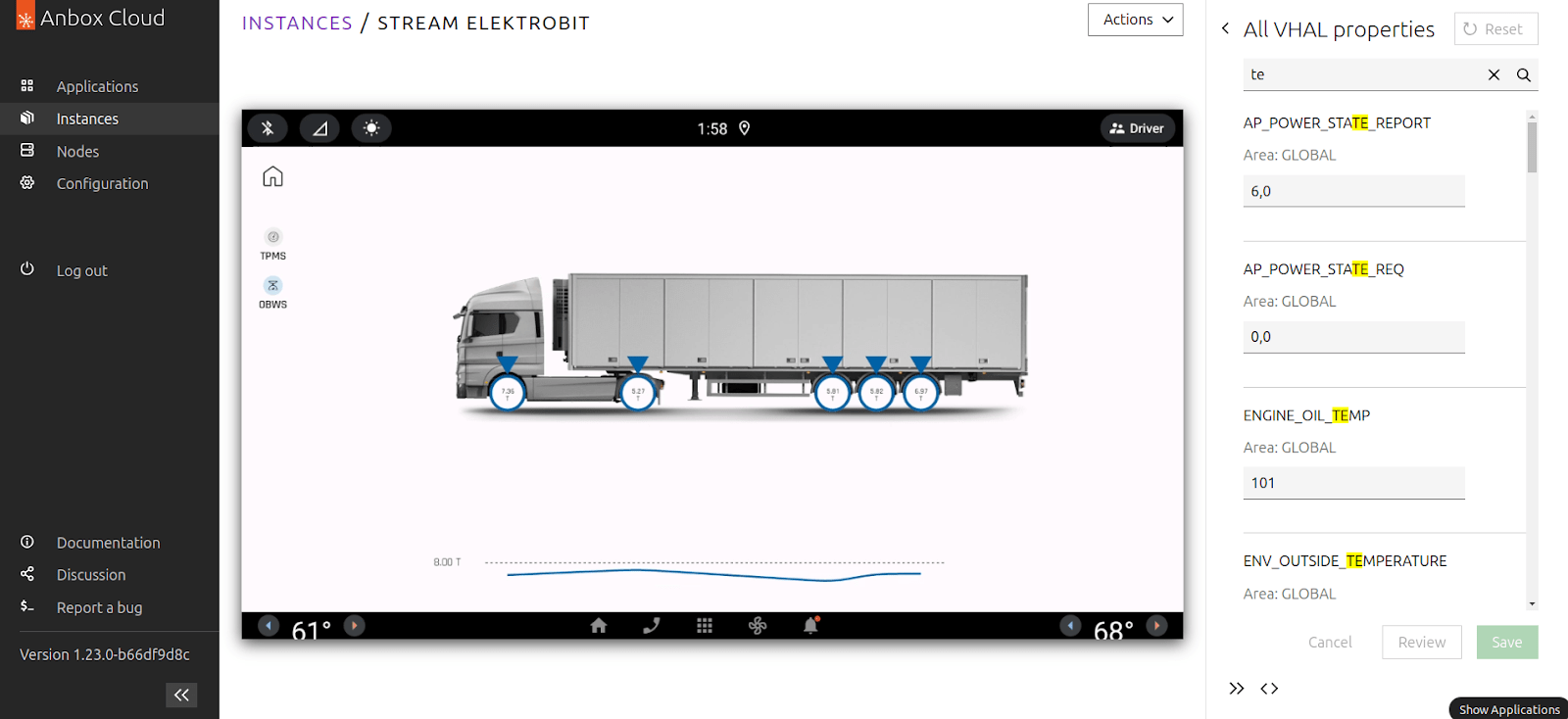
Testing custom APKs
Developers can test custom APKs (Android Application Packages) within Anbox, providing a stable environment for verifying app functionality and performance. This feature is particularly useful for ensuring that apps work correctly before they are deployed to vehicles. By allowing thorough testing in a controlled setting, developers can identify and fix issues early, reducing the risk of bugs and improving the overall quality of the software delivered to end-users. Now with VHAL support, Anbox offers very detailed control over Android simulation, empowering developers to create applications that not only meet but exceed industry standards for performance and reliability.
Furthermore, testing custom APKs in the Anbox environment allows developers to simulate real-world usage scenarios. They can test how their apps interact with other system components and third-party applications, securing optimal compatibility and stability. This holistic approach to testing ensures that the final product is not only functional but also stable under a wide range of conditions. By providing a safe and controlled environment for testing, Anbox helps developers deliver high-quality, user-friendly applications that meet the rigorous demands of the automotive industry.
Streamlining DevOps and CI/CD
Software companies know that incorporating DevOps and CI/CD methodologies helps improve development cycles; the same methodologies can be applied when it comes to automotive infotainment systems.
Seamlessly integrating into your company’s CI/CD process, Anbox maximizes workflow efficiency and improves time to market. By automating the testing and deployment processes, teams quickly identify and resolve issues, ensuring that new code is valid and ready for production.
Beyond that, the easy CI/CD integration helps maintain a high level of code quality and consistency. Anbox can be included in automated testing workflows, making sure that every change is thoroughly checked before being merged, reducing the risk of introducing bugs or regressions. This rigorous testing process builds confidence in the software’s stability and performance, making it easier to deploy updates and new features. The streamlined workflows enabled by integrating Anbox to your workflow also reduces the manual overhead and number of repetitive tasks, allowing developers to focus less on maintenance and more on innovation.
Furthermore, Anbox Cloud’s support for DevOps practices fosters a culture of collaboration and continuous improvement, leading to higher quality software and more efficient development processes. Let’s see how Anbox helps when it comes to collaborating between multiple teams.
Remote access to Android instances
Providing remote access to Android instances and management portals, Anbox can be seen similarly as some sort of Android Virtual Desktop Infrastructure (VDI). This is ideal for demonstration purposes and remote troubleshooting, as it allows stakeholders to interact with the Android system as if they were using it locally. This functionality is also particularly useful for showcasing new features, conducting training sessions, and providing remote support.
Remote access to Android instances enhances the flexibility and responsiveness of development teams. Developers can access and manage their instances from anywhere, they can quickly respond to issues or make necessary adjustments without being tied to a specific location. This remote capability also supports a more agile development approach, allowing teams to iterate and deploy updates faster. Moreover, Anbox Cloud remains covered by Ubuntu Pro, so you can be sure that your developers get access to security updates. All Android images provided by Canonical come with monthly Android security patches.
Anbox Cloud also offers remote instance streaming, developers can stream the Android instance to multiple devices simultaneously. This feature is particularly useful for distributed development and remote testing, allowing team members to view and interact with the system.
Additionally, remote instance streaming facilitates easier troubleshooting and support. Developers can diagnose and resolve issues immediately by accessing the Android instance from any location. This remote capability is also beneficial for conducting demos and presentations, providing stakeholders with a live view of the system’s functionality and performance.
Enhancing development with cloud-native solutions and scalability
Anbox Cloud relies on cloud-native approaches to provide a consistent and secure environment for developing and testing Android apps. By decoupling development from specific hardware, Anbox Cloud mitigates issues related to fragmentation and compatibility, common in the automotive industry. This flexibility allows developers to focus on the added value they can provide to the system instead of wasting time on the constraints of physical hardware.
Cloud-native solutions enable more scalable development processes, and it’s a well-known fact that automotive development often requires extensive testing and validation. With Anbox Cloud, resources can be dynamically allocated based on demand, ensuring that development environments are always available and responsive. This scalability supports larger development teams and more extensive testing, allowing for quicker iteration and more thorough validation of applications. The security features inherent in cloud-native architectures also protect sensitive data and intellectual property, providing a safe and reliable platform for automotive development.
In addition, the ability to scale resources on-demand helps manage peak periods of activity, such as during major development milestones or product launches. This capacity means that the development environment remains responsive and performant, even under heavy loads. By providing a scalable and cost-effective solution, Anbox Cloud enables automotive development teams to be more agile and responsive to development contingencies, changing requirements and market conditions.
Learn about Anbox Cloud at IAA Transportation 2024
By facilitating efficient testing, customization, and deployment of Android apps, and integrating seamlessly into CI/CD pipelines, Anbox Cloud is a powerful ally for developers.
Embrace the future of automotive development with the new Anbox automotive features and discover a game-changing way of creating the next generation of automotive infotainment systems and applications.
Curious to check it out? Come meet us at IAA Transportation 2024 in Hanover (Germany) and test our Anbox demo. We are looking forward to meeting you at our booth E36, hall 12.
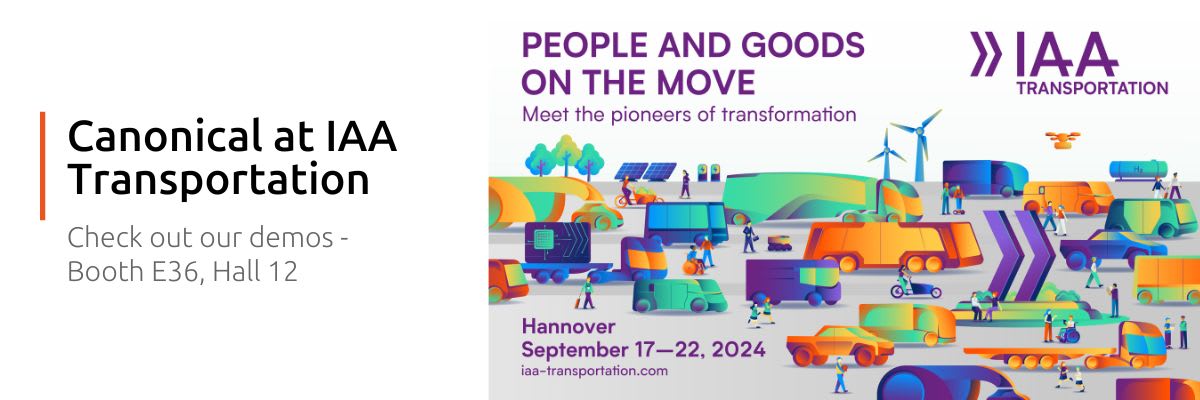
You can also join our webinar on Wednesday Oct 9th at 5pm CET to learn more about Anbox Cloud and its use cases in the automotive sector.
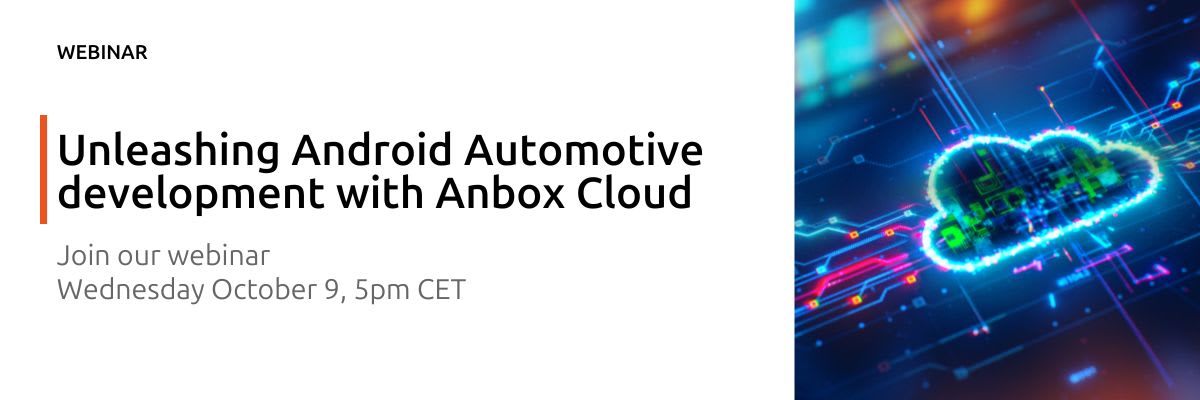
Or simply Contact Us now.
Android is a trademark of Google LLC.

